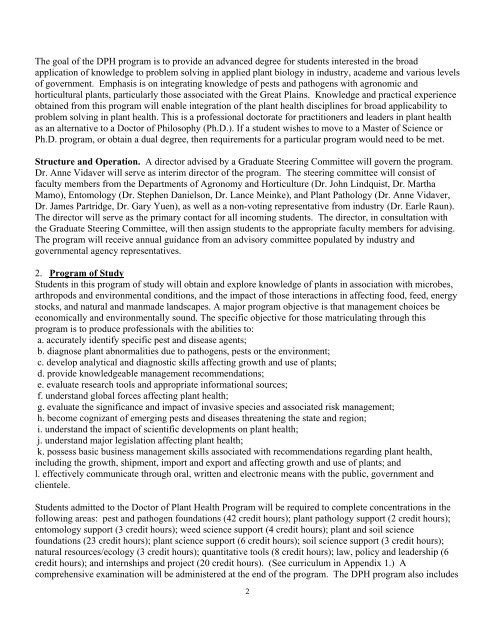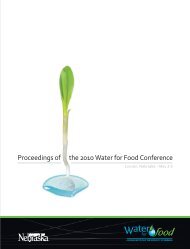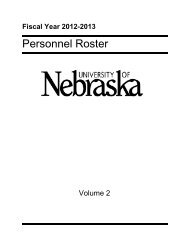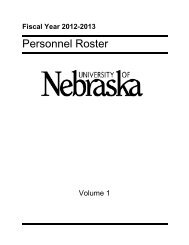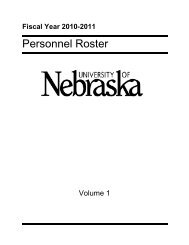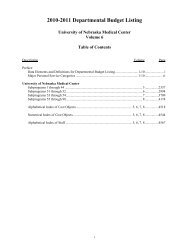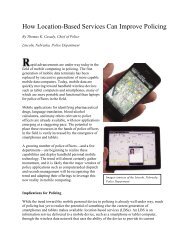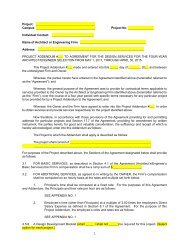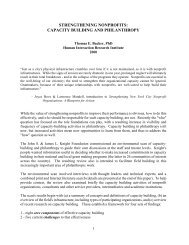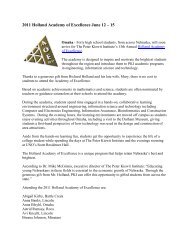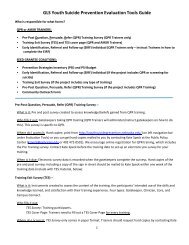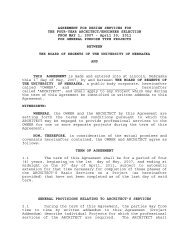September - University of Nebraska
September - University of Nebraska
September - University of Nebraska
Create successful ePaper yourself
Turn your PDF publications into a flip-book with our unique Google optimized e-Paper software.
The goal <strong>of</strong> the DPH program is to provide an advanced degree for students interested in the broad<br />
application <strong>of</strong> knowledge to problem solving in applied plant biology in industry, academe and various levels<br />
<strong>of</strong> government. Emphasis is on integrating knowledge <strong>of</strong> pests and pathogens with agronomic and<br />
horticultural plants, particularly those associated with the Great Plains. Knowledge and practical experience<br />
obtained from this program will enable integration <strong>of</strong> the plant health disciplines for broad applicability to<br />
problem solving in plant health. This is a pr<strong>of</strong>essional doctorate for practitioners and leaders in plant health<br />
as an alternative to a Doctor <strong>of</strong> Philosophy (Ph.D.). If a student wishes to move to a Master <strong>of</strong> Science or<br />
Ph.D. program, or obtain a dual degree, then requirements for a particular program would need to be met.<br />
Structure and Operation. A director advised by a Graduate Steering Committee will govern the program.<br />
Dr. Anne Vidaver will serve as interim director <strong>of</strong> the program. The steering committee will consist <strong>of</strong><br />
faculty members from the Departments <strong>of</strong> Agronomy and Horticulture (Dr. John Lindquist, Dr. Martha<br />
Mamo), Entomology (Dr. Stephen Danielson, Dr. Lance Meinke), and Plant Pathology (Dr. Anne Vidaver,<br />
Dr. James Partridge, Dr. Gary Yuen), as well as a non-voting representative from industry (Dr. Earle Raun).<br />
The director will serve as the primary contact for all incoming students. The director, in consultation with<br />
the Graduate Steering Committee, will then assign students to the appropriate faculty members for advising.<br />
The program will receive annual guidance from an advisory committee populated by industry and<br />
governmental agency representatives.<br />
2. Program <strong>of</strong> Study<br />
Students in this program <strong>of</strong> study will obtain and explore knowledge <strong>of</strong> plants in association with microbes,<br />
arthropods and environmental conditions, and the impact <strong>of</strong> those interactions in affecting food, feed, energy<br />
stocks, and natural and manmade landscapes. A major program objective is that management choices be<br />
economically and environmentally sound. The specific objective for those matriculating through this<br />
program is to produce pr<strong>of</strong>essionals with the abilities to:<br />
a. accurately identify specific pest and disease agents;<br />
b. diagnose plant abnormalities due to pathogens, pests or the environment;<br />
c. develop analytical and diagnostic skills affecting growth and use <strong>of</strong> plants;<br />
d. provide knowledgeable management recommendations;<br />
e. evaluate research tools and appropriate informational sources;<br />
f. understand global forces affecting plant health;<br />
g. evaluate the significance and impact <strong>of</strong> invasive species and associated risk management;<br />
h. become cognizant <strong>of</strong> emerging pests and diseases threatening the state and region;<br />
i. understand the impact <strong>of</strong> scientific developments on plant health;<br />
j. understand major legislation affecting plant health;<br />
k. possess basic business management skills associated with recommendations regarding plant health,<br />
including the growth, shipment, import and export and affecting growth and use <strong>of</strong> plants; and<br />
l. effectively communicate through oral, written and electronic means with the public, government and<br />
clientele.<br />
Students admitted to the Doctor <strong>of</strong> Plant Health Program will be required to complete concentrations in the<br />
following areas: pest and pathogen foundations (42 credit hours); plant pathology support (2 credit hours);<br />
entomology support (3 credit hours); weed science support (4 credit hours); plant and soil science<br />
foundations (23 credit hours); plant science support (6 credit hours); soil science support (3 credit hours);<br />
natural resources/ecology (3 credit hours); quantitative tools (8 credit hours); law, policy and leadership (6<br />
credit hours); and internships and project (20 credit hours). (See curriculum in Appendix 1.) A<br />
comprehensive examination will be administered at the end <strong>of</strong> the program. The DPH program also includes<br />
2


